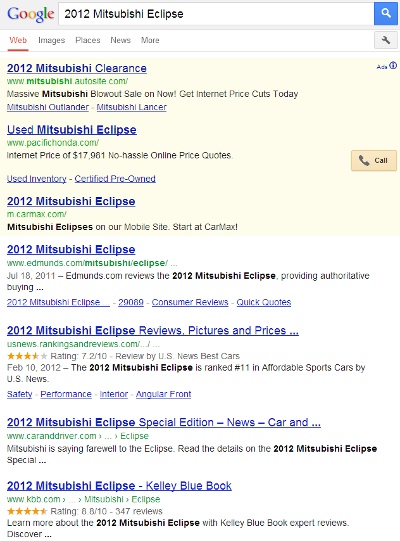Auto Industry Benefiting From Growth In Mobile Search
Approximately one-third of all search traffic for auto industry related terms comes from mobile devices. This underscores why it is critical for auto manufacturers, local dealerships, reviewers and local automotive resources to render their sites properly for nearly half of their current traffic, but to also be at the forefront of getting higher visibility for […]
Approximately one-third of all search traffic for auto industry related terms comes from mobile devices.
This underscores why it is critical for auto manufacturers, local dealerships, reviewers and local automotive resources to render their sites properly for nearly half of their current traffic, but to also be at the forefront of getting higher visibility for an ever-increasing share of mobile searchers.
Automotive Mobile Search Data
Just before Thanksgiving, in partnership with Nielsen data, Telemetrics released an insightful study on car-related mobile searching. The study revealed the importance of focusing on mobile SEO vs. standard desktop SEO, or being dependent on mobile apps with these key points:
- In the release (but not that I can discern from the actual report) it states 15% of auto consumers were using mobile search back in June 2012. As of November 2012, the query car on phrase or broad match in Google’s Keyword Tool reveals over 30% of the searches are coming from mobile devices.
- Mobile car searchers are using the Web over apps 92% of the time.
- Car searching is only an occasional habit, thus doesn’t necessitate users to download an app for chronic use.
- Online auto users can be broken down into:
- Car researchers
- Car deal hunters
- Gear heads
- Circumstantial or emergency car users
- About half the smartphone searches are looking to purchase a car within a day.
- 63% of mobile car searchers will click on an ad if it provides a discount or mobile coupon.
Automotive Mobile Search Results
For actual year-make-model automobile searches, the mobile percentage of search queries jumps to around 40%, such as for the 2012 Mitsubishi Eclipse. The site type most used by all car searches are informational, with the top two being Kelley Blue Book and Edmunds.
Let’s look at the results:
Automotive Mobile SEO Takeaways
- In this case, the top results on desktop and mobile are essentially the same, sans the ads on mobile that aren’t present on desktop.
- None of the top sites use an m. subdomain in the results themselves or resulting destination page, but a single URL for mobile.
- Mobile search has shorter display character limits for the Title and Description — for Mobile, the Title Tag should be up to 55 characters and Meta Description 100 characters for visibility purposes.
- Responsive design does not allow differentiating Title Tags, Meta Description or content on the same URL… but Dynamic Serving does, which Google approves and saves in load time.
- Both Kelley Blue Book and Edmunds are using dynamic serving.
- Edmunds varies the Title Tags on its mobile version pages to focus on review terms, while KBB looks to be in transition for its 2012 Mitsubishi Eclipse page as it just has “SEO Landing” in the Title Tag on the mobile page vs. “2012 Mitsubishi Eclipse — Kelley Blue Book” in the desktop version.
- Both sites’ search results are currently depending on their desktop serving, but are providing different mobile Meta information to put them ahead as Google refines its mobile results going forward.
Mary Meeker just recently accelerated her prediction on mobile Internet growth and with it, mobile search, as Google must adjust its results for differentiating mobile searchers’ intent and needs. The past may be prologue; but, having your finger on the search pulse, you can discern where mobile search is going.
Opinions expressed in this article are those of the guest author and not necessarily Search Engine Land. Staff authors are listed here.
Related stories
New on Search Engine Land

